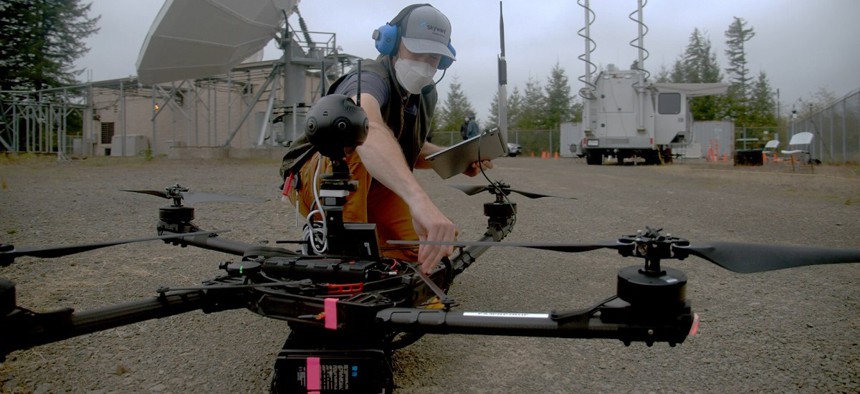Lockheed Martin, Verizon Demonstrate Capabilities of 5G-Enabled Drones for DOD

A Lockheed Martin drone is prepared for a demonstration with Verizon's 5G capabilities. Courtesy: Verizon
Recent tests showcase how multiple drones can conduct real-time transfers of intelligence, surveillance and reconnaissance data to geolocate military targets.
Lockheed Martin and Verizon are testing the deployment of 5G-connected drones capable of collecting and sharing real-time data over both public and private wireless networks to enhance the Department of Defense’s intelligence, surveillance and reconnaissance capabilities.
The joint demonstration was held in May at Lockheed’s 5G test range in Waterton, Colo., where government officials—including representatives from the Army, Air Force and Pentagon—were reportedly present. Lockheed previously announced in November 2021 that it was partnering with Verizon to develop “5G.MIL,” a military-centric 5G network designed to provide secure and interoperable communications.
Lockheed and Verizon also held two additional internal demonstrations in September to continue refining the 5G-enabled drones by running them through more difficult and intensive simulations, and there are plans to hold another external test in November for government officials.
The demonstrations underscored the ability of in-flight 5G-enabled drones to capture and share intelligence, surveillance and reconnaissance—or ISR—data used by DOD to geolocate potential military targets. Footage from the tests was shown in a video during a media roundtable on Tuesday with representatives from Lockheed and Verizon.
During the tests, Lockheed flew four rotary wing drones—or “quadcopters”—that were linked to two on-site private network nodes provided by Verizon to securely transfer ISR data. Verizon and Lockheed said in a press release that the drones were able to identify lower-power radio frequency—or RF—signals emitted by simulated military targets, because “real-time drone sensing data was transmitted over the Verizon network and then processed by advanced signal processing algorithms running on edge compute resources, enabling geolocation of the signal source.”
Dan Rice, Lockheed’s vice president for 5G.MIL programs, said at Tuesday’s media roundtable that the ISR data captured by the drones was “a combination of high-band, digitized RF data and video data.”
“The high-speed, real-time transfer of that data from multiple drones simultaneously through those 5G private networks is an example of the applicability of 5G.MIL and edge processing technology to support military forces and increase situational awareness on the battlespace,” Rice said.
Rice added that the tests also showcased the ability to securely transfer ISR data over both a private 5G network and a simulated public 5G network, which he called an opportunity for DOD “to extend and diversify its communication pathways.”
“This is significant because the military often operates in extreme and austere environments with limited connectivity, and 5G.MIL technology is meant to operate in military environments to be compatible with as many types of networks as possible,” Price said. “Public networks will extend the reach of 5G.MIL to a range of military environments where commercial networks may be available.”
Srini Kalapala, Verizon’s senior vice president for technology and product development, said at the roundtable that the 5G-enabled drone project was just one of the ways that Verizon is working with DOD to use 5G technologies, adding that “we’ve seen the United States Department of Defense taking historic action to advance 5G communications.”
DOD has moved in recent years to embrace the use of 5G technologies across military installations and operations. The department’s 5G Strategy, released in May 2020, underscored the “long-term economic and military advantage” that 5G offers and noted that the high-speed connectivity it provides will “transform the way militaries operate.” DOD also announced in October 2020 that it was awarding $600 million “for 5G experimentation and testing” at five military sites across the country to help enhance the department’s 5G capabilities.
Last September, Verizon announced that it was selected by DOD to provide its 5G Ultra Wideband services to seven Air Force installations across the country. Earlier this month, Verizon also received an $11.5 million award from DOD to build a private 5G network in an aircraft maintenance hangar on Joint Base Pearl Harbor Hickam in Hawaii.
NEXT STORY: NASA’s DART Mission Hits Asteroid






